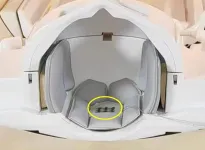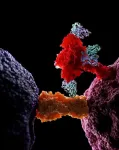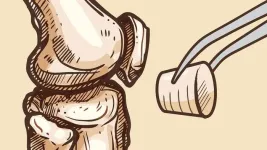This self-powered sensor could make MRIs more efficient
2024-05-31
(Press-News.org) MRI scans are commonly used to diagnose a variety of conditions, anything from liver disease to brain tumors. But, as anyone who has been through one knows, patients must remain completely still to avoid blurring the images and requiring a new scan. A prototype device described in ACS Sensors could change that. The self-powered sensor detects movement and shuts down an MRI scan in real time, improving the process for patients and technicians.
During an MRI scan, a patient must stay entirely still for several minutes at a time, otherwise “motion artifacts” could appear and blur the final image. To ensure a clear picture, patient movement needs to be identified as soon as it happens, allowing the scan to stop and for the technician to take a new one. Motion tracking could be achieved using sensors embedded into the MRI table; however, magnetic materials can’t be used because metals interfere with the MRI technology itself. One technology that’s well-suited for this unique situation, and avoids the need for metal or magnetic components, is the triboelectric nanogenerator (TENG), which powers itself using static electricity generated by friction between polymers. So, Li Tao, Zhiyi Wu and colleagues wanted to design a TENG-based sensor that could be incorporated into an MRI machine to help prevent motion artifacts.
The team created the TENG by sandwiching two layers of plastic film painted with graphite-based conductive ink around a central layer of silicone. These materials were specifically chosen as they would not interfere with an MRI scan. When pressed together, electrostatic charges from the plastic film moved to the conductive ink, creating a current that could then flow out through a wire.
This sensor was incorporated into an MRI table designed to lay under a patient’s head. In tests, when a person turned their head from side to side or raised it off the table, the sensor detected these movements and transmitted a signal to a computer. Then, an audible alert played, a pop-up window on the technician’s computer appeared and the MRI scan ceased. The researchers say that this work could help make MRI scans more efficient and less frustrating for patients and technicians alike by producing better images during a single procedure.
The authors do not acknowledge a funding source for this work.
###
The American Chemical Society (ACS) is a nonprofit organization chartered by the U.S. Congress. ACS’ mission is to advance the broader chemistry enterprise and its practitioners for the benefit of Earth and all its people. The Society is a global leader in promoting excellence in science education and providing access to chemistry-related information and research through its multiple research solutions, peer-reviewed journals, scientific conferences, eBooks and weekly news periodical Chemical & Engineering News. ACS journals are among the most cited, most trusted and most read within the scientific literature; however, ACS itself does not conduct chemical research. As a leader in scientific information solutions, its CAS division partners with global innovators to accelerate breakthroughs by curating, connecting and analyzing the world’s scientific knowledge. ACS’ main offices are in Washington, D.C., and Columbus, Ohio.
To automatically receive news releases from the American Chemical Society, contact newsroom@acs.org.
Note: ACS does not conduct research, but publishes and publicizes peer-reviewed scientific studies.
Follow us: X, formerly Twitter | Facebook | LinkedIn | Instagram
END
[Attachments] See images for this press release:


ELSE PRESS RELEASES FROM THIS DATE:
2024-05-31
(May 31, 2024) — In the years prior to an Alzheimer’s disease or other memory disorder diagnosis, credit scores begin to weaken and payment delinquency begins to increase, concludes new research led by Georgetown University. The findings show consistent deterioration in these financial outcomes over the quarters leading up to diagnosis. The findings also show that credit card and mortgage delinquencies, specifically, both increase substantially prior to diagnosis.
The research was released today by the Federal Reserve Bank of New York (FRBNY). (“The Financial Consequences of Undiagnosed Memory Disorders”).
“Most memory disorders ...
2024-05-31
INDIANAPOLIS — Nearly 3% of all children in the United States are diagnosed with autism, according to the Centers for Disease Control and Prevention. But a collaborative team of researchers at Indiana University and Purdue University are finding ways to make the right diagnosis sooner.
“The number of children needing autism evaluations exceeds the capacity of specialists trained to provide this service,” said Rebecca McNally Keehn, PhD, assistant professor of pediatrics at the IU School of Medicine. “Children and their families are currently waiting a year or more to access evaluations. ...
2024-05-31
Researchers at Vanderbilt University Medical Center have isolated human monoclonal antibodies against influenza B, a significant public health threat that disproportionately affects children, the elderly and other immunocompromised individuals.
Seasonal flu vaccines cover influenza B and the more common influenza A but do not stimulate the broadest possible range of immune responses against both viruses. In addition, people whose immune systems have been weakened by age or illness may not respond effectively to the flu shot.
Small-molecule drugs that block neuraminidase, a major surface glycoprotein of the ...
2024-05-31
Novel CAR T cell therapy obe-cel yields strong remission rates in adults with relapsed or refractory B-ALL (Abstract 6504)
The novel anti-CD19 autologous chimeric antigen receptor (CAR) T cell therapy obecabtagene autoleucel (obe-cel) achieved durable remissions in 40% of patients with relapsed or refractory B-ALL without a subsequent stem cell transplant (SCT), according to results from the Phase Ib/II FELIX clinical trial presented today by Elias Jabbour, M.D., professor of Leukemia.
At a median follow-up of 21.5 months, these patients were in ongoing remission ...
2024-05-31
Osteochondral defects (OCDs) can cause damage to cartilage and underlying bone, leading to chronic pain and loss of joint function. Depending on the extent of damage, individuals must undergo surgical treatment, the most extensive being total knee replacement, which over 800,000 Americans undergo each year.
Dr. Melissa Grunlan, professor in the Department of Biomedical Engineering at Texas A&M University, received a grant from the National Institute of Arthritis and Musculoskeletal and Skin Disease, a suborganization of the National Institutes ...
2024-05-31
Recently published research led by the University of Colorado Anschutz Medical Campus examined the prevalence — and impact — of physicians’ ethical or religious barriers to their involvement in medical aid in dying (MAiD), a multi-step process where a physician provides a terminally ill adult with decision-making capacity with a lethal dose of medication to end their life.
The research article, “Conscience-Based Barriers to Medical Aid in Dying: A Survey of Colorado Physicians,” was published this May in the Journal of General Internal Medicine. It shows that 26% of physician ...
2024-05-31
The latest book of prolific author David Julian McClements is a family affair. The Distinguished Professor of Food Science, along with his daughter Isobelle Farrell McClements and nephew Jake McClements, have written “How to be a Successful Scientist: A Guide for Graduate Students, Postdocs, and Professors” (Springer, 2024).
The three authors offer different perspectives as scientists at different stages in their careers. Julian McClements, who has published more than 1,300 scientific articles and numerous books, is the most highly ...
2024-05-31
Converting home heating systems from natural gas furnaces to electric heat pumps is seen as a way to address climate change by reducing greenhouse gas emissions.
But a new University of Michigan study of 51 Southeast Michigan households shows that switching to efficient, cold-climate heat pumps would increase annual utility bills by an average of about $1,100.
Home weatherization upgrades, such as adding attic insulation and sealing around doors and windows, could help reduce utility bills and make ...
2024-05-31
A new, nano-scale look at how the SARS-CoV-2 virus replicates in cells may offer greater precision in drug development, a Stanford University team reports in Nature Communications. Using advanced microscopy techniques, the researchers produced what might be some of the most crisp images available of the virus’s RNA and replication structures, which they witnessed form spherical shapes around the nucleus of the infected cell.
“We have not seen COVID infecting cells at this high resolution and known what we are looking at before,” said Stanley Qi, ...
2024-05-31
Community gardens in higher-income Boulder neighborhoods have fewer varieties of bees than their medium-income counterparts, new University of Colorado Boulder research suggests. Scientists suggest that people in these neighborhoods tend to apply more landscaping practices, such as using fertilizers, which could impact bees’ habitats.
The finding appeared May 22 in the journal Urban Ecosystems.
“Bees are so important for local ecosystems through their pollination services. The landscape would not look the same without our pollinators,” ...
LAST 30 PRESS RELEASES:
[Press-News.org] This self-powered sensor could make MRIs more efficient





